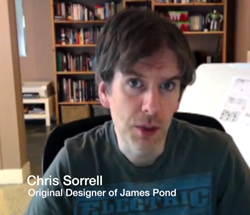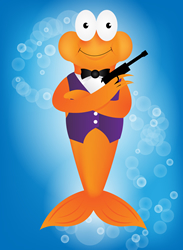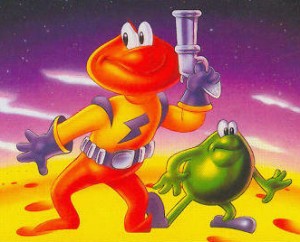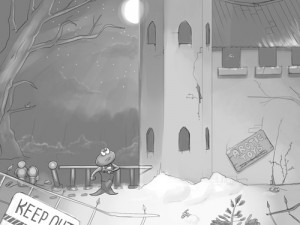 Chris Sorrell cut his coding teeth on the Amiga before eventually finding himself working on titles like MediEval and Primal on the Playstation 2. Getting his start as an graphics artist, he eventually moved on to his true passion, programming, and he soon formed the company Vectordean with Steve Bak and Tim Coupe. At the tender age of 18 he came up with what would eventually become James Pond. In addition for creating the character, Sorrell coded and did graphics work on all three Pond games on the Amiga. Though he didn’t work on the Genesis ports of Underwater Agent and RoboCod, he was the lead programmer for Operation Starfish.
Chris Sorrell cut his coding teeth on the Amiga before eventually finding himself working on titles like MediEval and Primal on the Playstation 2. Getting his start as an graphics artist, he eventually moved on to his true passion, programming, and he soon formed the company Vectordean with Steve Bak and Tim Coupe. At the tender age of 18 he came up with what would eventually become James Pond. In addition for creating the character, Sorrell coded and did graphics work on all three Pond games on the Amiga. Though he didn’t work on the Genesis ports of Underwater Agent and RoboCod, he was the lead programmer for Operation Starfish.
Sorrell left Vectordean in 1994 and joined Millennium Interactive, where he did MediEvil and its sequel, along with Primal and other games. He later moved on to Radical Entertainment, where he worked on Prototype. and Prototype 2 before leaving to start his own indie studio with his wife.
Recently, Sorrell was contacted by Gameware to take part in the Kickstarter revival of the James Pond franchise. Mr. Sorrell was kind enough to chat with Sega-16 about Pond and the new campaign.
Sega-16: It took you just seven months to create the original James Pond title. How much of the game did you do yourself and what kind of schedule did you have in order to create the game from the ground up so quickly?
Chris Sorrell: The first James Pond was really just myself and Steve Bak (founder of Vectordean and renown programmer from the early days of the Atari ST and Amiga). I had been working with Steve for about 18 months before starting Pond 1, initially as a graphics artist (Dogs of War, Fire & Brimstone, Bad Company) and then being given a chance to prove myself as a programmer with a conversion of one of Steve’s early games (Hercules on C64, re-worked to become Yolanda on Amiga/ST). James Pond was my first chance to make my own game, to handle both programming and graphics too (since we didn’t have any other artists at the time). Really in this era there was no such thing as a schedule… I mean we had monthly payment milestones with Millennium, but those were reasonably loose in terms of specifics as I recall… so really I just worked like crazy – which was easy because I was so passionate about what I was doing, and very appreciative to have the opportunity to be making my own game! Design wasn’t a dedicated discipline back then, so really the game mechanics were largely my responsibility also (with contributions from Steve and others at Millennium).
 Sega-16: Underwater Agent was the first European-developed game for the Sega Genesis. How did your small company come to the attention of such a major publisher as Electronic Arts?
Sega-16: Underwater Agent was the first European-developed game for the Sega Genesis. How did your small company come to the attention of such a major publisher as Electronic Arts?
Chris Sorrell: I wasn’t really in the loop on the details of business affairs back then, but I believe this was a relationship forged by Millennium, based on the reasonable success and eminent console suitability of James Pond. The interesting bit came when the deal was signed and we started to work with EA. As far as I know, we were actually the very *first* developer working with them in Europe on the Genesis. Since there was very little access to Sega or Nintendo platforms outside of Japan back in the early days of 16-bit, EA had actually completely reverse engineered the Genesis platform to create their own development tools. Steve visited their headquarters in San Francisco and returned with a Macintosh computer as “excess baggage.” This system, the hand-crafted boards inside it, and the installed custom build tools were used to develop both Pond 1 and Pond 2 on the Genesis.
Sega-16: Did Electronic Arts ever put any pressure on your team to create other titles besides James Pond, or was the company flexible about production?
Chris Sorrell: I don’t believe there was ever pressure to work on specific titles or not, but certainly they were interested in working with us outside of the Pond games. Rolo to the Rescue was a project that came from exactly that relationship, and was being worked on by programmer Alan McCarthy during the earlier stages of Pond 3’s development.
Sega-16: What did you think of developing for the console? Sales potential aside, did you see the opportunity as a worthy challenge or would you have preferred to stick with computers?
Chris Sorrell: The Pond 1 conversion to Genesis was entirely Steve’s work. He was super efficient at getting up and running quickly with new hardware, and we didn’t have long to get the conversion done. The downside to that, for this game, was that goals were very modest: just port the Amiga game and simplify down or remove anything that might not be a straightforward fit for the platform (for example Genesis sprites were 32 pixels high (I think) which was less tall than some of the original Amiga characters so it fell to me to rework the artwork to make them fit, rather than building a more sophisticated sprite management system). This was clearly the right approach since we hit our deadlines and the game shipped successfully.
For Robocod, we brought in a new programmer: Simeon Pashley, who was to look after the Genesis format. I developed the ‘lead’ version of the game on the Amiga and he looked after the Genesis code and also programmed the bosses. Robocod was a little more ambitious as a Genesis game (we fixed the sprite size limitations), but not much. We still had a tough deadline that was in fact one month *earlier* than that for the Amiga version. All told, that meant we had about eight months for the Genesis build, and consequently things did get very tight towards the end. The thing that I felt suffered most were the parallax backgrounds. They lacked any dedicated graphics (just using palette adjusted versions of foreground tiles) and no custom effects. By comparison the Amiga version had a full month of time spent pretty much exclusively on the backgrounds. I went to town on Amiga ‘copper’ effects (a technique allowing the color gradations often seen in Amiga games), and so for me at least, this made the Amiga version by far the prettier of the two (even though the Genesis was really far better suited to running a game like this).
When it came to James Pond 3, I was keen to do the console version myself and to make sure that this really was the premium version of the game. We had a bit more time, had already learnt quite a lot about the Genesis and felt ready to do something more ambitious…
On a personal level I was always most excited to work on the platform that could deliver the coolest result, so certainly that meant I was very excited to work on the consoles just as soon as I could (although I certainly enjoyed the Amiga since it offered some quite unique capabilities).
Sega-16: You’ve said that you were “proud to have made a credible Amiga title” with Underwater Agent. Do you feel the same way about the Genesis version? Did it manage to convey that particular Amiga charm that fans love about the machine so much?
Chris Sorrell: Like I say, I don’t personally think that the Genesis version was all that it could have been, at least visually. Thankfully, the (shared) gameplay was pretty solid (and with more consistent frame-rate than the Amiga), and I guess there was enough of the visual charm that the game was still very well received. On the Amiga, I think Robocod did became quite a genre defining game. It was followed by titles like Harlequin and Zool, both of which seemed to owe it quite a debt.
Sega-16: The difference in sales between the first James Pond title and the second was quite large. Were you surprised at RoboCod’s success, or did you feel the series was finally hitting its stride?
Chris Sorrell: I don’t recall really thinking about sales numbers much at the time. Review scores meant more to me, and certainly I was super proud to see Robocod building on the reasonable reception of Pond 1, with quite a few really rave reviews.
Sega-16: Operation Starfish had a much more troubled development process than the other games. What was it that made working on it so difficult? Was it the pressure of matching RoboCod’s success, the increased competition among mascot platformers at the time or some other factor?
 Chris Sorrell: Pond 3 was definitely the point where I started to realize how successful the first two games had actually been, and it started to feel like there was a significant chance to hit *really* big with the third game, as well as a considerable and direct need to make a game that was truly competitive with the big boys (e.g. Sonic). I can’t blame anyone else for applying those pressures. I’ve always been someone that places the highest expectations upon myself, but yes, this did have a major part to play in the more troubled development process. I guess there were two specific goals where those pressures were most felt: I wanted to make a game with the slickness of Sonic and the depth of Mario. Considering that our team size was still pretty tiny compared with the teams behind those games, this inevitably wasn’t going to end as well as I wanted it to! All told, despite the protracted development, I still look back on the result with pride. I think the game came passably close to achieving both goals for those that stuck with it.
Chris Sorrell: Pond 3 was definitely the point where I started to realize how successful the first two games had actually been, and it started to feel like there was a significant chance to hit *really* big with the third game, as well as a considerable and direct need to make a game that was truly competitive with the big boys (e.g. Sonic). I can’t blame anyone else for applying those pressures. I’ve always been someone that places the highest expectations upon myself, but yes, this did have a major part to play in the more troubled development process. I guess there were two specific goals where those pressures were most felt: I wanted to make a game with the slickness of Sonic and the depth of Mario. Considering that our team size was still pretty tiny compared with the teams behind those games, this inevitably wasn’t going to end as well as I wanted it to! All told, despite the protracted development, I still look back on the result with pride. I think the game came passably close to achieving both goals for those that stuck with it.
Sega-16: Why do you think it’s taken so long for Pond to finally make a comeback?
Chris Sorrell: Complicated… After Pond 3, I actually spent about a year working on another Pond game. This started as a Genesis title, before we decided that the platform was in too steep a decline. I then switched to PC, and it became less of a console game and more a Monkey Island-style adventure.. Then the 32-bit console era began, and I guess we lost confidence in our approach, plus new console opportunities presented themselves. At that point I was getting pretty weary of Pond and keen to build something new, which I then had the opportunity to do with MediEvil. During MediEvil’s development, there was a strange company split that occurred. I stayed with a portion of the Millennium studio that became Sony Cambridge, while the other half of the company went off to work with a new AI technology (first seen in Creatures), taking the rights to James Pond with them. Those rights bounced around a couple more times, coming to rest with Gameware. They sold specific rights (e.g. for Robocod conversions) to another company but didn’t really have the opportunity to do much new with Pond.
A couple of years back there was James Pond and the Deathly Shallows. I don’t honestly know the background to that one, nor who specifically developed it, but suffice to say it didn’t really represent any kind of a comeback for Pond, and is a far cry from what we’re hoping to do with this Kickstarter campaign.
Sega-16: You had no involvement with later Pond games, as the rights to the character were owned by other companies. Did you ever feel like Pond wasn’t being used properly? Were you ever tempted to pursue the rights?
Chris Sorrell: Since I’ve been plenty busy over the years, and because I’m someone that always tries to look forward rather than back, I never imagined working on another Pond game until Gameware recently approached me. That said, yes, for me personally it has been disappointing to see the respectable legacy of my original games diminished by repeated ports to new platforms (especially where graphics and original levels were reworked, for the worse in my opinion). My excitement for the potential of a new Pond game via Gameware’s Kickstarter campaign was slightly dented by the (to my mind) cynically timed announcement of still more Robocod ports by the game’s current licence holder. If our Kickstarter is successful then I believe we have the chance to make the brand new Pond game that loyal fans deserve.
Sega-16: What was your initial reaction when contacted about bringing back James Pond?
Chris Sorrell: I didn’t take much convincing that a new Pond game could be a cool thing. I’ve had a lot of ideas over the years that would fit perfectly in the Pond world, and which are only now possible on modern hardware. I was less convinced about whether there would be enough fan demand for a new game to make Kickstarter viable (time will tell on that one!). On a personal level, I don’t really like asking people for money, but I was convinced of the many benefits – for the fan – of the Kickstarter approach. It really came down to ‘would I want to miss the potential opportunity to redefine Pond?’ and certainly if anyone’s going to be doing that then I’d like it to be me. 🙂
Sega-16: Providing that the Kickstarter campaign is successful, what kind of future do you see for the James Pond series on modern hardware? Do you see retail or digital download releases?
 Chris Sorrell: Assuming the Kickstarter is funded, then I hope that we can define a new look for a Pond game that plays to modern platform strengths while retaining the retro charm and character of the original games. I’d like to build a game that still plays in 2D, but incorporates 3D elements to the look and feel. I’m sure it would be very easy to build on that with further games. As for retail or digital, I would have to say digital, not least because that’s the direction that everything is heading, but also because it’s a path to market that affords so much more power and flexibility to smaller developers without having to work within the limitations and constraints imposed by the major retail players.
Chris Sorrell: Assuming the Kickstarter is funded, then I hope that we can define a new look for a Pond game that plays to modern platform strengths while retaining the retro charm and character of the original games. I’d like to build a game that still plays in 2D, but incorporates 3D elements to the look and feel. I’m sure it would be very easy to build on that with further games. As for retail or digital, I would have to say digital, not least because that’s the direction that everything is heading, but also because it’s a path to market that affords so much more power and flexibility to smaller developers without having to work within the limitations and constraints imposed by the major retail players.
Sega-16: Is this campaign a one-time event, or do you see yourself involved in more original Pond adventures in the future?
Chris Sorrell: I don’t think anyone’s planning anything beyond the current campaign, since this is obviously such a major test of player interest in Pond, but no doubt if we can make this one work, there’d be enthusiasm to do more. For me, I’d take one game at a time, and my excitement level would be dependent upon whether I believed the opportunity was there to make something genuinely stand-out and compelling each time. I hate feeling like I’m creatively standing still. But then again, if I’m able to have a hand in bringing back Pond this time, it might be tough to then just pass him on once again!
Many thanks to Mr. Sorrell for the interview. For more information about the new James Pond game, be sure to check out its Kickstarter page.
James Pond art propert of ACampion.

Recent Comments